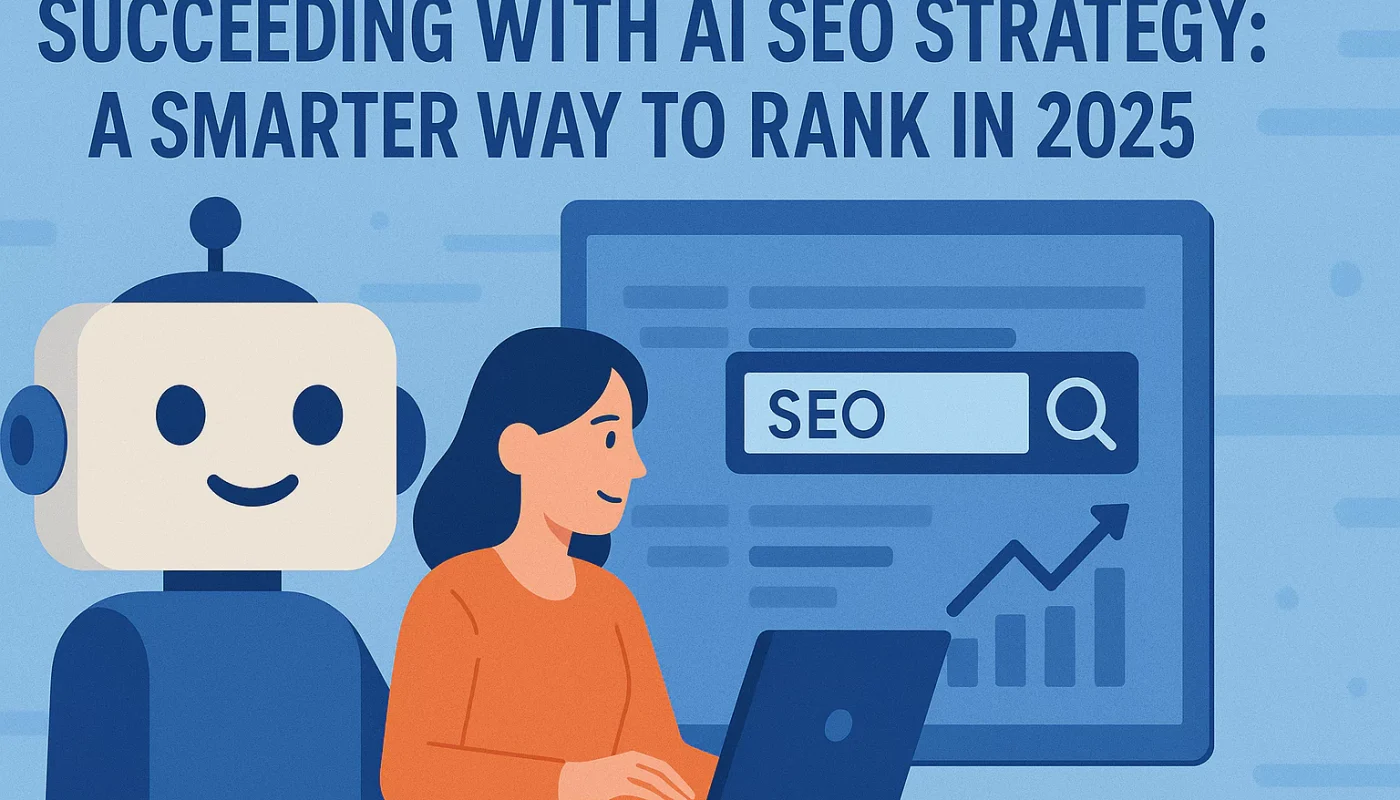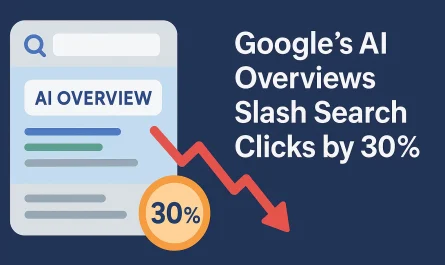Table of Contents
As generative search and smart algorithms reshape the game, SEO is evolving fast. Old-school methods like cramming in keywords or relying just on backlinks fall short now. To compete, brands, marketers, and creators need to embrace an AI SEO approach. It offers a sharper and more effective way to increase visibility, climb rankings, and match changing user needs.
If you’re running a content-focused blog or growing a large-scale website creating a strong AI SEO strategy can give you a big advantage. This article dives into how AI-driven SEO works why it matters in 2025, and ways to set it up and make it grow .
What Does an AI SEO Strategy Involve?
An AI SEO strategy uses artificial intelligence at every part of the SEO process. From finding keywords and writing content to improving the site, checking for technical issues, and tracking results, AI plays a big role. It relies on things like machine learning natural language tools, and automating data tasks to make SEO choices that are quicker, smarter, and more precise.
AI SEO strategies shift away from relying on old methods or guessing. They instead aim to understand what users want how searches are changing, and use predictions to stay ahead. This creates content that matches user needs, organizes sites better, and works well with Google or other AI-powered ranking systems.
Why an AI SEO Plan Will Be Crucial in 2025
Here’s how things are evolving:
- AI-driven search engines now provide answers , like Google’s SGE and Bing Copilot.
- NLP technology dives deeper into context and tone, not just focusing on keywords.
- The web is becoming overcrowded with AI-created content making competition tighter.
- More people now use voice commands smart devices, and image-based searches.
To succeed in this space, you need to adapt your SEO tactics. Using AI can:
- Spot valuable opportunities
- Develop content that ranks well and drives action
- Keep you updated on algorithm changes
- Scale optimizations without lowering quality
Essential Parts of an AI SEO Plan
Organizing Keywords by Intent
Good SEO now focuses on what users want, not just how often they search. Tools such as MarketMuse, Surfer SEO, and SEOtreasures.com examine search engine data to find trends and categorize keywords by related topics.
Example: Instead of focusing on “best CRM software,” your AI tool could suggest related keyword groups like:
- “CRM tailored to small businesses”
- “CRM including automation features”
- “Top CRMs rated for agencies”
These help you create content targeting specific intentions. This strengthens expertise in a topic and enhances search rankings.
Efficient Content Drafting Using NLP
You can produce drafts, outlines, or entire pieces using tools like ChatGPT, Jasper, and Koala Writer. The true value comes by blending AI’s quick output with human skill.
Tips to follow:
- Use AI tools to create clear outlines and useful headers.
- Add examples from real life, case studies, or unique points of view.
- Focus on E-E-A-T, which stands for Experience, Expertise, Authoritativeness, and Trustworthiness.
- Make sure every bit of content has a clear role—to teach, sell, or keep readers engaged.
Semantic Optimization and On-Page SEO
AI ensures content does more than just match keywords. Platforms like Surfer and Clearscope rely on NLP to suggest terms, entities, and organization that match Google’s view of the subject.
Improve:
- Meta descriptions and titles
- Anchor text along with internal links
- Subheadings like H2s and H3s
- Alt text for images and structure with schema markup
You’ll boost not rankings but also clicks and how users interact with your content.
Predictive SEO Insights
AI looks ahead—it doesn’t just focus on the past. Machine learning tools can spot trends , warn you about content losing relevance, and notify you of ranking changes as they happen.
AI can help to:
- Keep an eye on ranking changes
- Spot unexpected SERP updates
- Check how fresh and relevant your content is
- Recommend updates before your traffic dips
This smarter SEO strategy keeps you ahead in competitive markets.
AI-Powered Technical SEO Audits
AI tools spot and rank technical SEO problems with amazing precision. These tools dive into things like broken links, page speed issues, and mobile design flaws. Tools such as Screaming Frog, Sitebulb, and JetOctopus (enhanced with AI capabilities) provide deeper details and simplify fixes.
Key tasks to automate include:
- Improving Core Web Vitals
- Managing crawl depth and identifying orphan pages
- Handling structured data and schema setup
- Fixing indexing and canonicalization problems
Reducing errors improves crawling performance and boosts rankings.
AI-Powered Link Building
Backlinks still matter a lot, but the way outreach works has changed. AI can locate good-fit sites, examine their link profiles, and create better outreach emails that are more likely to work.
Use AI to speed up your link-building game:
- Spot link gaps compared to competitors.
- Group prospects by their niche and level of authority.
- Use AI to tailor pitch templates to fit specific needs.
- Monitor placement results with reporting tools built for smarter tracking.
If done well, this creates more than backlinks. It helps grow both trust and referral traffic.
Keep Evolving and Learning
AI SEO has the advantage of ongoing learning. To improve your strategy, add feedback loops that show metrics, audience habits, and how content performs.
Focus on these metrics:
- Organic visitors and conversions
- SERP highlights like snippets, FAQs, and “People Also Ask” sections
- User interactions such as time spent on the page and how far they scroll
- Mentions of your content in AI tools like SGE or Copilot
Change your approach based on proven results. Let AI handle the hard work while you focus on what matters.
Real-World Example: Boosting SEO With AI
Picture this: You manage a SaaS platform aimed at HR experts. By adopting an AI-driven SEO plan:
- You find a group of target phrases like “employee retention software.”
- AI generates five main articles along with twenty related blog posts written to fit search intent.
- Suggestions for internal links across the articles show up .
- Weekly AI insights highlight outdated content and recommend updates.
- AI scores leads, helping focus link-building efforts on well-known HR blogs.
In three months, you see a 60% jump in organic traffic while putting in far less manual work.
Final Thoughts: AI Isn’t Taking Over SEO—It’s Changing the Way It Works
AI SEO strategy does not aim to replace your own knowledge. It aims to enhance how you use it. It provides tools to help you make better decisions, act quicker, and secure long-term ranking success.
To succeed in search in 2025, focus on more than just SEO. Embrace AI-driven SEO instead.
Want guidance to plan your AI SEO approach or select the right tools? Contact us, and we’ll create a strategy that’s both stronger and more efficient for your brand.
FAQs
Q. What does an AI SEO strategy mean?
An AI SEO strategy takes a new approach to search engine optimization by using artificial intelligence tools like natural language processing, machine learning, and automation. This method aims to refine keyword focus, create better content, enhance technical SEO, and improve performance tracking. It emphasizes understanding user intent, predicting behavior, and scaling optimization efforts.
Q. How does AI change traditional SEO?
AI makes SEO more sophisticated and flexible. Instead of focusing on keywords and backlinks modern SEO pays attention to semantic relevance, user intent detailed content, and AI-recognized signals like engagement or topical authority. AI tools evaluate huge amounts of data to find new chances and provide automated suggestions.
Q. Why focus on user intent over keyword count?
AI search platforms like Google’s SGE and Bing Copilot focus on figuring out what users need rather than looking at their exact words. This means content should focus more on answering the user’s intent—whether they want information, directions, or to make a purchase—than just including specific keywords.
Q. What tools are available to use an AI SEO strategy?
Some well-known AI SEO tools include Surfer SEO, Clearscope, MarketMuse, Jasper, ChatGPT, SEOtreasures.com’s AI Dashboard, and Semrush. These tools assist in creating content outlines improving semantic relevance, monitoring SERPs, and doing competitor research.
Q. How does AI assist in creating content?
AI-driven writing tools create outlines, draft materials propose subtopics, and improve SEO—all within minutes. When paired with human creativity and expertise in specific subjects, these tools make it possible to produce top-notch content on a large scale.
Q. Is technical SEO still relevant in an AI-first approach?
Yes, and even more now. AI crawlers need sites to load quickly, have clear organization, and work well on mobile devices. AI-powered tools for SEO audits can find problems like slow page loading, schema markup issues, indexing errors, and weak user experience signals.
Q. How does predictive SEO work? What does it mean?
Predictive SEO relies on AI to predict search patterns, updates to algorithms, and how keywords perform. It allows you to adjust content or improve pages that are not doing well before traffic declines. This provides an advantage in strategy.
Q. Can AI assist with link building?
Yes. AI can spot missing backlinks, evaluate possible link sources based on authority and relevance, and even create tailored outreach emails. This makes link building faster and more precise.
Q. Which metrics matter for an AI SEO strategy?
Important metrics include:
- Visits from organic search and conversions
- Appearances in SERP features like snippets, FAQs, or SGE
- CTR compared to impressions
- On-page activity like scroll depth or time spent on a page
- Signals of updated content and AI-generated references
Q. How can I start using an AI SEO strategy?
Set clear goals and pick tools that suit your needs. Organize keywords by purpose, create clusters around main topics, streamline content planning, and rely on AI-powered audits to track results. Check out SEOtreasures to find a full set of tools and a strategy guide.

